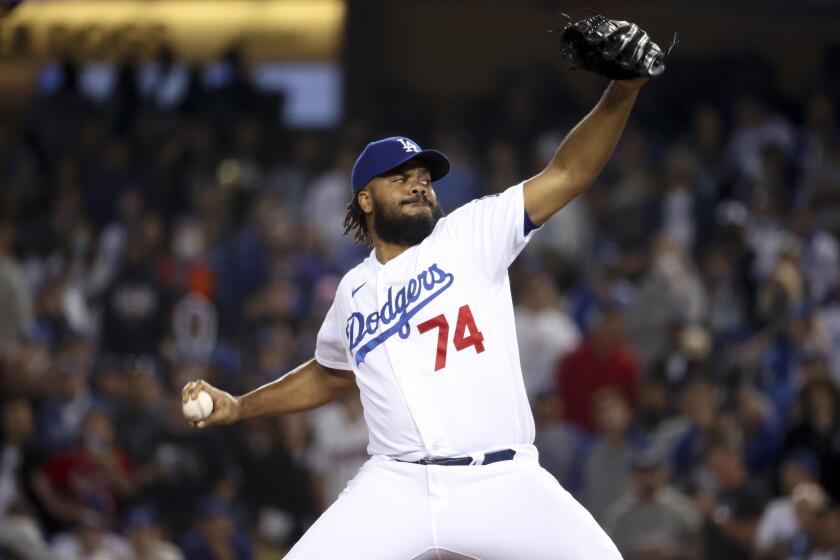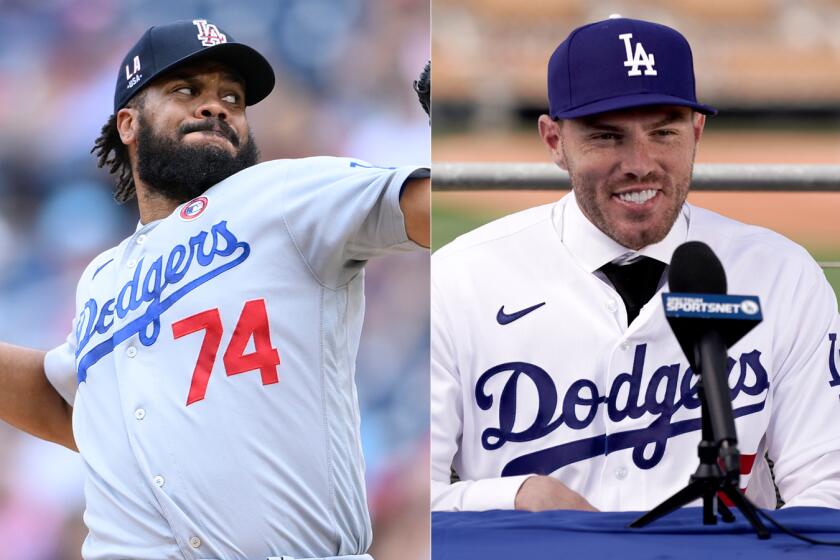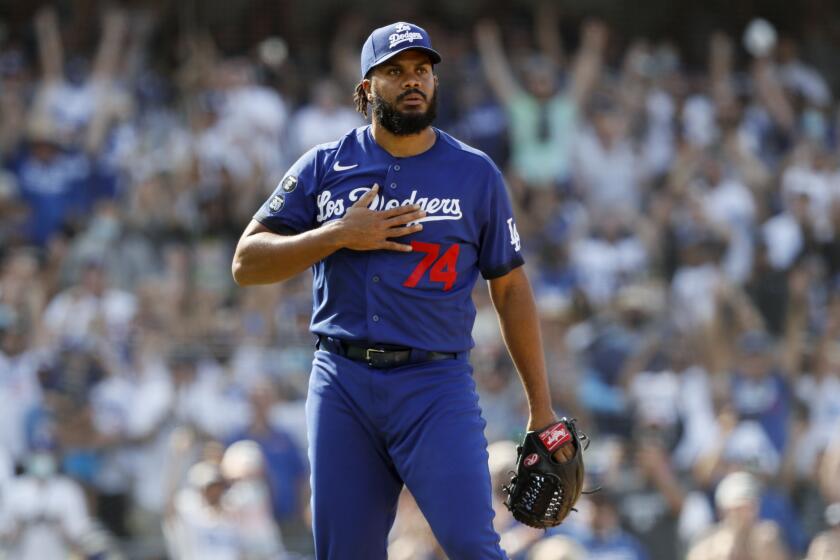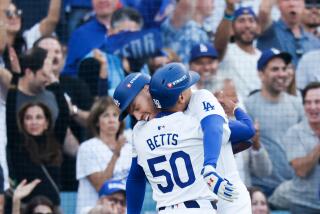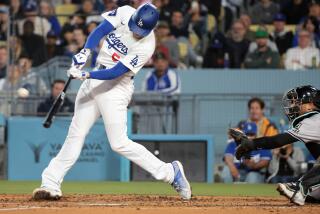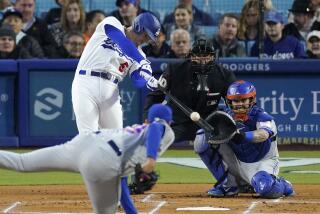Kenley Jansen explains why he signed with the Braves instead of the Dodgers
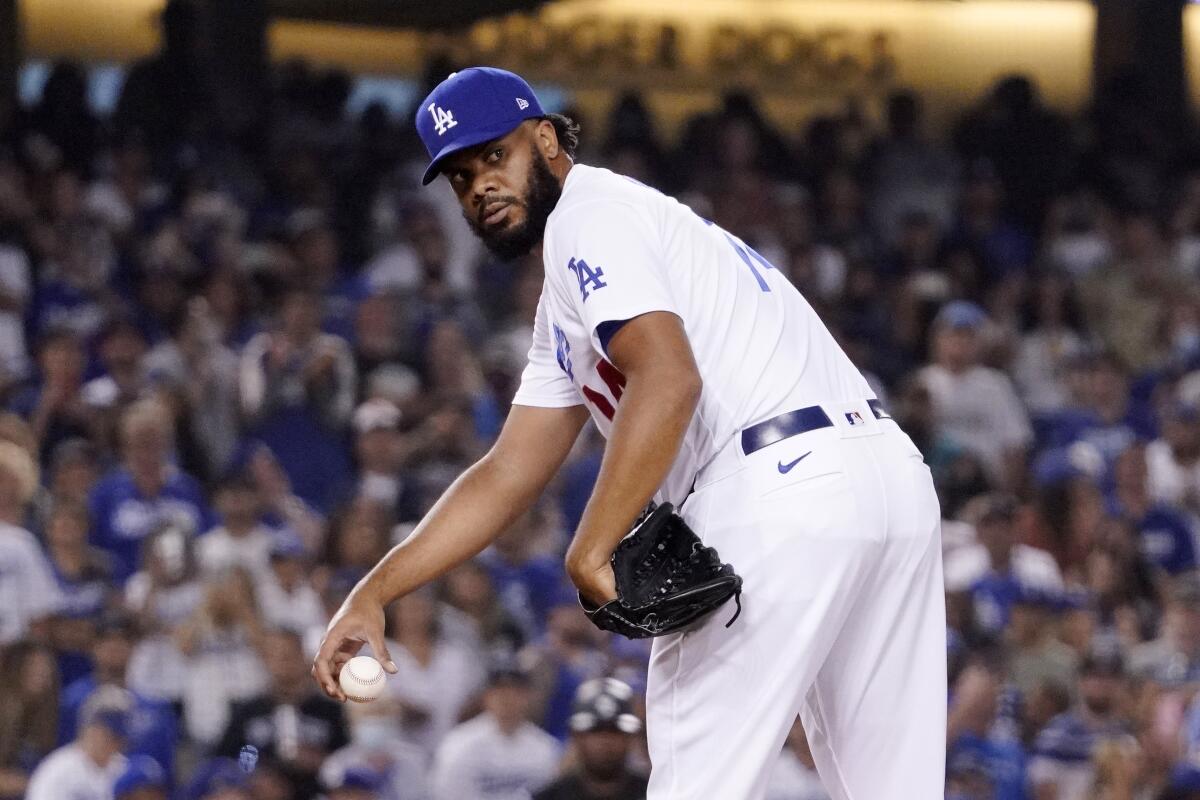
- Share via
NORTH PORT, Fla. — For the first time in 17 years, after spending half of his life in the Dodgers organization, Kenley Jansen reported to work Sunday for another Major League Baseball club.
He walked into the expansive clubhouse at CoolToday Park, spring training home of the Atlanta Braves a dozen miles from Florida’s Gulf Coast, just after 9 a.m. He found his locker sandwiched between a minor leaguer’s stall and an unoccupied space — prime real estate reserved for an accomplished veteran. A makeshift nameplate was slapped overhead. Jansen was scribbled in black marker. His signature number, 74, was in red.
The 34-year-old closer put on a Braves T-shirt and a blue true spring training hat and spent the next two hours working up a sweat. It was both a jarring sight and a dream fulfilled.
Jansen spent his first 12 major league seasons with the Dodgers, but he grew up rooting for the Braves in Curaçao. His favorite player was Fred McGriff. Andruw Jones, MLB’s first Curaçaoan star, became an idol. When his brother, Ardley, signed with the organization in 1999, he would visit Braves spring training every year.
A day after Kenley Jansen signed with the Atlanta Braves, Dodgers manager Dave Roberts and his former teammates praised his contributions to the club.
“That’s where this love started, man,” Jansen said.
And yet Jansen would have ultimately preferred a return to the Dodgers. The two parties were engaged during the offseason, before the lockout and after. Minutes after the lockout was lifted, Jansen recalled, Dodgers manager Dave Roberts sent him a text message with a simple question: “Are you coming back?”
Jansen, the Dodgers’ all-time leader in saves with 350, sought a three-year contract all winter, according to people with knowledge of the situation. He didn’t find any takers.
The Dodgers were one of a few clubs willing to commit to two years. But the situation was further complicated when they agreed to a six-year, $162-million deal with former Braves first baseman Freddie Freeman last Wednesday. The development produced a new wrinkle: The Dodgers wanted Jansen to wait until they shed payroll before signing to keep their payroll under $290 million and avoid the resulting 90% tax rate for exceeding the competitive balance tax line for the second straight season.
MLB and the players’ union’s agreement to extend Trevor Bauer’s paid administrative leave last Thursday through April 16 — and kick issuing an expected suspension down the road — meant the only way the Dodgers could remove money from their books was through a trade.
“I started to feel that the Dodgers had to make stuff happen,” Jansen said. “And, at the same time, you got to deal with the reality of what’s best for you and your family.”
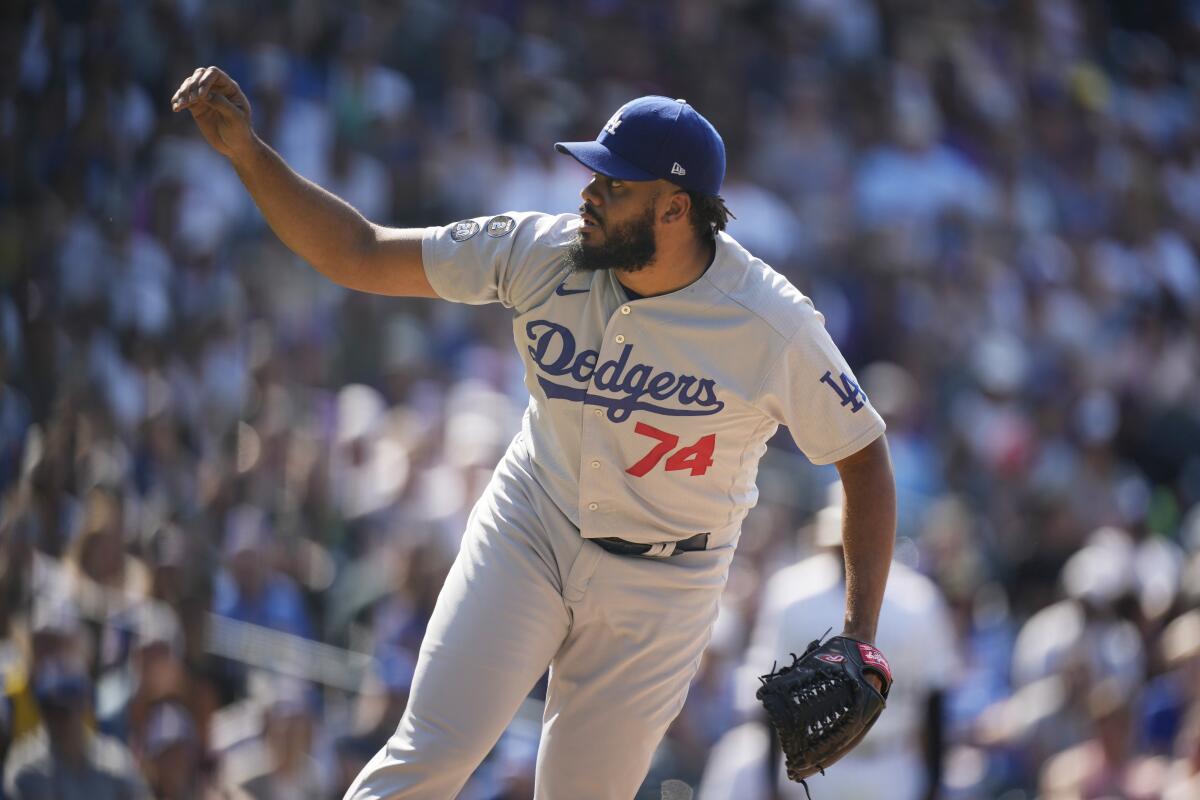
“They tried to bring me back, but unfortunately I had to make a decision and I chose to be with the Braves.”
— Kenley Jansen, on picking the Braves over the Dodgers
Meanwhile, the Braves, according to people with knowledge of the situation, reached out to Jansen’s representation Friday with an offer for one year and $16 million. The team gave him a few hours to decide. They were prepared to move on if he didn’t accept by the deadline.
Jansen was intrigued by the idea of playing for a World Series contender and the team he loved growing up. He weighed the offer versus the risk of waiting for the Dodgers, realizing the chances of landing a three-year contract this late were slim to none. He opted for the Braves’ guarantee.
“They made the moves over there,” Jansen said of the Dodgers. “They tried to bring me back, but unfortunately I had to make a decision and I chose to be with the Braves.”
Jansen on Saturday spoke on the phone with Andrew Friedman, the Dodgers’ president of baseball operations. He described the conversation as “emotional.” He insisted there are no hard feelings.
“I was a young kid from Curaçao when I signed there,” Jansen said. “And they taught me to be a man and be a father and be a great husband to my wife and that’s what stands out from that organization. And, also, I can say I’m a champion and it’s awesome.”
Jansen’s move added another chapter to an unforeseen rivalry between National League powers on opposite coasts.
Freddie Freeman says he felt hurt by how the Braves didn’t make a big effort to keep him. Kenley Jansen could probably say the same about the Dodgers.
The Dodgers and Braves have met in the postseason three of the last four years. The Dodgers beat Atlanta in the 2018 NLDS and again in the 2020 NLCS, coming back from a 3-1 deficit on their way to winning the World Series. Last season, the Braves toppled the Dodgers as heavy underdogs in an NLCS rematch and beat the Houston Astros in the World Series.
Last week, a plot twist added some drama. On Wednesday, Freeman, a Braves icon, signed with the Dodgers after negotiations with the Braves ended and they acquired Matt Olson to replace him. Like Jansen, Freeman spent 12 seasons with the team to begin his major league career. Unlike Jansen, his departure was messy.
“There’s nothing but great things I can say about the Dodgers,” Jansen said. “First-class organization.”
The Braves’ bullpen helped carry the club to the championship in October, but Braves president of baseball operations Alex Anthopoulos determined it was too left-handed-heavy at the start of the offseason. He prioritized adding right-handed relievers.
Anthopoulos said he first reached out to Will Smith, the team’s closer, to gauge whether the veteran would be open to relinquishing the ninth-inning role. Smith gave the green light. Next was figuring out which relievers were attainable. Jansen, Raisel Iglesias, and Mark Melancon were atop the free-agent list. Craig Kimbrel, the only active player with more saves than Jansen, was available via trade.
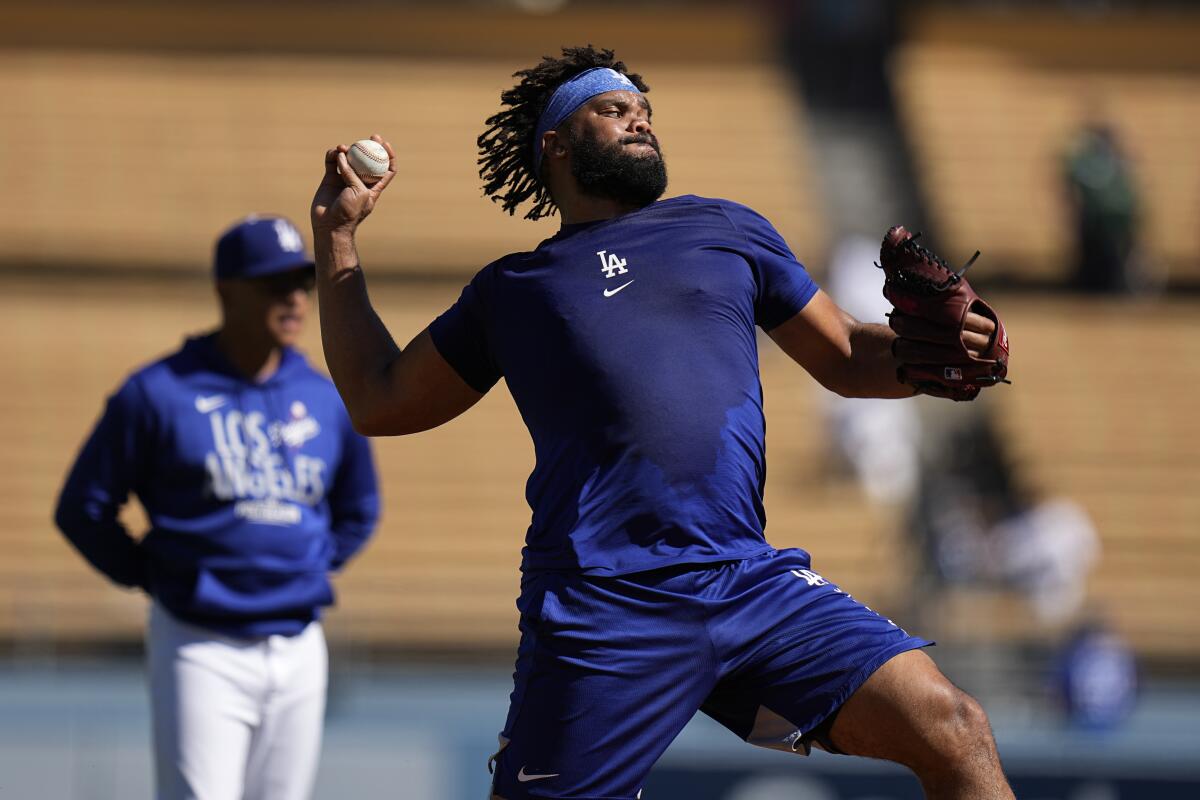
The Braves were discussing a trade with the Chicago White Sox for Kimbrel, who will also make $16 million this season before hitting free agency next offseason, before landing Jansen. Re-signing outfielder Jorge Soler was another option if Jansen didn’t say yes.
Anthopoulos is familiar with Jansen. He spent two seasons in Friedman’s front office before moving to Atlanta. Those two years — 2016 and 2017 — were the best of Jansen’s career. He was the most dominant reliever in the majors, stifling hitters with his signature cutter.
But Anthopoulos said he was most impressed by Jansen’s willingness to assume a bigger workload in the 2016 playoffs weeks before becoming a free agent for the first time. He completed the effort with three perfect innings in Game 6 of the NLCS against the Chicago Cubs. That winter, he signed a five-year, $80-million contract to stay in Los Angeles.
“He’s just a total team guy,” Anthopoulos said. “He didn’t have $80 million in the bank, and he didn’t even bat an eye. It wasn’t like he had to be convinced. He didn’t even flinch. What’s that tell you about him?”
Jansen doesn’t reside on that lights-out level anymore. His velocity has diminished. His walk rate has climbed and his strikeout rate has dipped. Last season, however, he rebounded to post a 2.22 ERA in 69 outings by mixing in more sinkers and sliders.
“I think we’re getting a really good reliever,” Anthopoulos said. “I don’t want to put expectations on him. Look, I think the contract reflects we believe in him, you know?”
Days after the Dodgers signed former Braves star Freddie Freeman, Atlanta signed former Dodgers closer Kenley Jansen to a one-year contract.
When Jansen accepted that contract, he called Jones to thank him for paving the way for ballplayers from their small island in the Atlantic. He reached out to former teammates and coaches. Roberts told him he’d always be part of his family. Jansen called his brother, Ardley, the former Braves minor leaguer.
“Hey, this is for you,” he told him.
It’s a dream come true for a kid from Curaçao. But the door isn’t shut on the Dodgers. The contract is, after all, for just one year and Jansen’s family will remain in Los Angeles year-round.
For now, at least, he’ll walk out to “Welcome to Atlanta” at Truist Park after a decade of “California Love” and “2 of Amerikaz Most Wanted.” The ninth inning at Dodger Stadium won’t be the same.
More to Read
Are you a true-blue fan?
Get our Dodgers Dugout newsletter for insights, news and much more.
You may occasionally receive promotional content from the Los Angeles Times.

